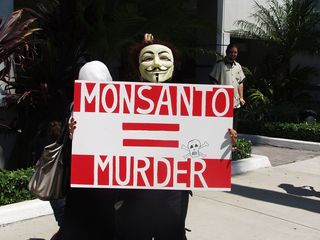Bias
Why Following the Evidence Is So Hard: The Case of GMOs
Astonishingly, authors discussing bias may show biases of their own.
Posted June 19, 2019 Reviewed by Gary Drevitch
Since my book came out, I’ve been giving talks on evidence-based strategies for overcoming polarization. A question I often get is about the usefulness of the evidence I provide. Many people are feeling increasingly skeptical of scientific studies.
This isn’t so surprising. Big tobacco has tried to manipulate and undermine scientific findings to make cigarettes appear less harmful. Knowing the power of lobbies might, unfortunately, make us wary of trusting scientific findings in general. In addition to worries that financial interests may be manipulating findings, there are a slew of other legitimate concerns, like studies being done on small or non-representative samples of people, and being difficult to replicate. And if they’re not careful, researchers can interpret findings in biased ways, making them seem to mean something that they don’t.
In a thought-provoking and disturbing article, William A. Wilson argues that our knowledge may even be going backwards on certain topics, not because the scientific method is flawed, but because its application so frequently is.
Let’s consider a polarizing topic–Genetically Modified Organisms (GMOs). I should mention that I have no strong feelings about GMOs, and no financial stake in this debate. What I’m interested in is the process of how issues become polarized. Those concerned about the safety of eating GMOs often reference a study that generated this terrifying image:

Google says it’s in about 25,270,000,000 search results. Talk about viral. But it turns out that the study had all sorts of flaws and was eventually retracted. Other studies haven't linked GMOs to cancer. (On the other hand, glyphosate, found in the herbicide Roundup, may be a carcinogen.)
Cherry-picking one (retracted) study of rats to support the conclusion that eating GMOs causes cancer in humans would be deeply biased. We may be starting with a conclusion (“I want to believe that GMOs cause cancer”) and then ignoring or trying to discredit evidence to the contrary while seeking to find (or create) supportive evidence.
Fear of GMOs is frequently offered as just such a textbook example of bias. In their valuable work The Knowledge Illusion authors Steven Sloman and Philip Fernbach reflect on fear of GMOs as a case study in irrationality. Others mention how we fear what’s complicated and difficult to understand, or the biases created by the ideology and emotions at play in the GMO debate.
Astonishingly though, those studying bias and giving the example of GMO fears may be showing biases too. (Perhaps I’m also doing that, and others will need to point it out.) From the literature I’ve reviewed, I couldn’t find any solid evidence of harms created by consuming GMO foods. So the issue is clear-cut. Right?

Well, both sides raise claims about undisclosed conflicts of interest and the other side standing to profit from its framing of the debate. Academics have even argued that the apparent scientific consensus on GMO safety is an illusion.
Whether any of this is true, it does muddy the waters, making it tougher for the average person to know what evidence is really credible.
This is certainly not to say that we need to discard the evidence of GMO safety. But perhaps we can accept that, while some people do make up their minds out of irrational fears, others are more careful. Their concerns may or may not be accurate, but they’re not just blatantly false and baseless, like the “Pizzagate” conspiracy theory.
Let’s continue with the assumption that the general scientific consensus about GMO safety is real and due to solid and unbiased research. There’s another major issue. Authors and scientists discussing biases among opponents of GMOs often mix different claims together–for instance, that GMOs are safe for human consumption and are necessary to fight global starvation. It’s regularly said that irrational fears prevent GMO fixes that could literally be our best chance to “save civilization”! Who could disagree with saving civilization? Framings like these are clearly themselves emotional and polarizing, not value-neutral reflections of evidence.
In her work on scientific uncertainty in emerging biotechnology, Deborah Scott explains that there are various ways to not know something. Generally, we talk about risks, but in scientific terms, those require conditions that are fairly well understood, where potential outcomes can be identified and their probabilities attributed. There can also be uncertainty (where the types and scales of possible outcomes are understood, but their probabilities are not), ambiguity about how to define and measure the situation, and ignorance–we don’t know what we don’t know.
So it’s important to be clear about what issue we’re considering. Whether or not eating GMOs causes cancer is unrelated to if GMOs can help address starvation or “save civilization.” The latter issues are full of ambiguity and ignorance. They raise countless questions from “What are the social and ecological benefits and harms of GMOs, and for whom?” to “Does planting GMOs promote the best possible farming practices?” These are largely political questions, not ones scientists can simply “solve.”
Looking into these complex questions leaves plenty of room for reasonable disagreement depending on how we choose to frame the issues–what we want to focus on and measure and what we want to ignore. For instance, global environmental scientist Jonathan Foley writes, “Very few of the GMO crops in use today are feeding the world’s poor; instead, they are crops used in the world’s wealthier countries, mainly to fatten animals, make unnecessary biofuels and food additives, or make cheap clothing.” He argues that if one is seeking to feed the world, the focus would need to be on issues like addressing food waste and promoting more sustainable diets.
Even if we look at the evidence on crop yields, it too seems unclear. A lengthy investigation by the New York Times suggests that planting GMOs may do little to increase real-world yields.
So collapsing all of the ambiguity and ignorance about these vast questions into the simple claim that we need GMOs to feed the world goes far beyond just being reasonable.
As in most conflicts, when we get into the messiness of the details, the situation is not so clear-cut as it appeared. We may be overly confident that the other side is irrational while our views are evidence-based. I believe that, whatever the issue, we can usually benefit from continued curiosity and from considering how our reasoning may be motivated, perhaps in subtle ways, by assumptions rather than strong evidence.




